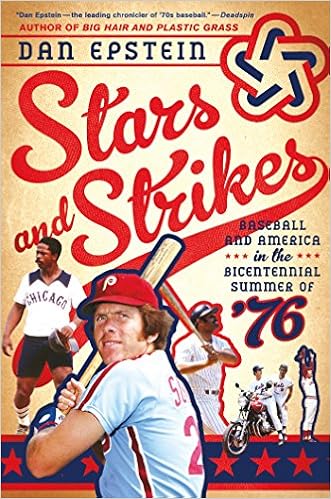
It should be obvious given the subtitle, but suffice it to say that Dan Epstein’s book about baseball in 1976 has little to offer people who aren’t serious baseball fans with a keen interest in the history of the National Pastime.
However, for diehard seamheads like me, Epstein’s panoramic look at baseball at a turning point is a thoroughly enjoyable read, even if his level of detail can be mind-numbing at times.
Baseball was in an interesting place in 1976. The reserve clause, which had tied players to teams on extremely friendly terms for the owners had finally been struck down in court, and the era of big money free agency was on the horizon. Those owners included such famous and infamous figures as promotional wizard Bill Veeck (Chicago White Sox), burgeoning cable magnate Ted Turner (Atlanta Braves), tightfisted Charlie Finley (Oakland A’s) and of course George Steinbrenner, who was just starting out his tenure as owner of the Yankees.
Ownership drama takes up a surprisingly large part of the book, a percentage justified by the interesting twists and turns behind the scenes. The San Francisco Giants came within a hair’s breath of moving to Toronto until Mayor George Moscone intervened. The city of Seattle was suing Major League Baseball after the loss of the Pilots left the city with an empty Kingdome dragging down the local economy. And Congress was hauling Commissioner Bowie Kuhn into town to justify keeping the game anti-trust exemption, mostly because they were still upset that baseball had abandoned the capital.
On the field, colorful personalities and fantastic teams abounded. Mark Fidrych came out of nowhere to become the game’s biggest star, talking to the ball on the mound and compiling shutout after shutout. The Big Red Machine in Cincinnati was steamrolling opponents in search of a second consecutive World Series title. The New York Yankees reached their first World Series in a dozen years on a home run in the ninth-inning of the final game of the ALCS. It was the last season in the majors for Hank Aaron and Frank Robinson. George Brett, Mike Schmidt, Reggie Jackson, Johnny Bench, Nolan Ryan, and Tom Seaver were all in the prime of their careers.
Though he ventures outside the world of baseball sparingly, Epstein, a frequent contributor to Rolling Stone, is quite adept at covering the pop culture of 1976, from the beginnings of punk rock with the Ramones and the explosion of Disco music to the gritty realism of movies like Taxi Driver. He also spends a bit of time covering both America’s over-the-top celebration of the bicentennial and the presidential election campaign between the unelected incumbent Gerald Ford and a peanut farmer from Plains, Georgia named James Earl Carter.
Though Epstein persuasively makes the case for 1976’s prominence in the history of baseball, the events of that year let me down when it comes to ending his narrative. The World Series between the Cincinnati Reds and the New York Yankees was a 4-0 rout in favor of the Reds, and even Epstein struggles to convey anything interesting about the games.
Two weeks after the season ended, Jimmy Carter won the presidency by a surprisingly narrow margin and a day later, MLB free agency began in earnest for the first time. The biggest splash was made by the Yankees, who signed Reggie Jackson and won the World Series in each of the next two years.
